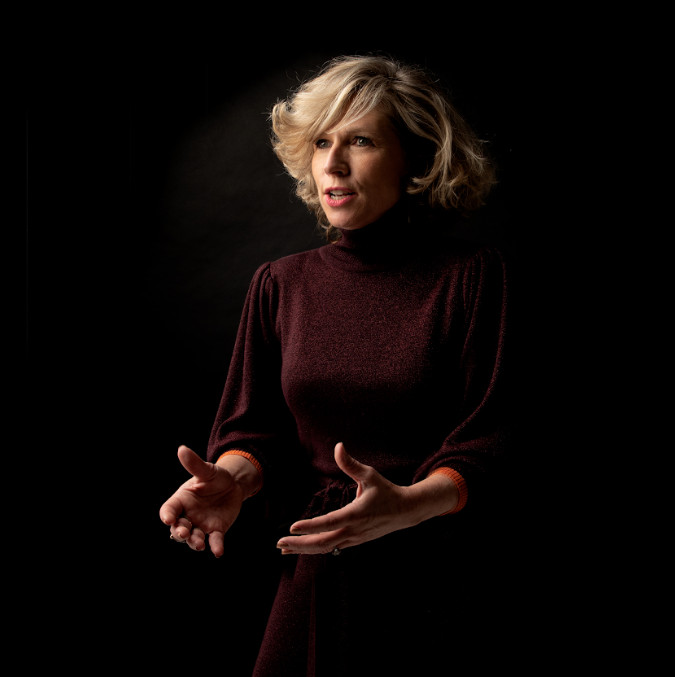Sonya Lennon is well known for her work in styling and fashion but, more recently, has carved a role in promoting social justice and now, is possibly equally known for her work in championing equitable workplaces.
Sonya Lennon is a business founder, designer, stylist, television presenter and champion for equal rights. Known for her clothing brand, Lennon Courtney, as well as a television career as a stylist, her career has, in recent years, segued into campaigning for social justice. What was the catalyst for this change?
“It came from a sense of injustice for women in general in the workplace. I felt the need to use my voice, which grew when I developed a public profile through broadcasting. It wasn’t something I expected, but it connected me to a bigger discussion.”
Her stellar reputation as a fashion stylist led to involvement in Dress for Success Ireland which she says helped align her skills with creating an impact beyond herself. The work helped to augment her view that leadership should focus on collective responsibility.
“It’s not about individual success but about moving society forward together with a value system that benefits everyone.”
Gender Bias?
Does she think male leaders have a different experience?
“I went back and did a master’s in Business Equity, Diversity, and Inclusion during COVID, and the gender piece is really interesting. I’ve always created my own culture, transitioning from freelance work to creating organisations. The only time I faced challenges was when I entered someone else’s culture in a big institution, and I found it difficult to navigate.”
She adds, “But I’ve never felt limited by a gendered lens in my career. Now, as my work expands, I’m considering these issues through a societal lens. These aren’t just women’s issues; they impact everyone, from how we raise our boys and girls to how efficient our businesses are.”
Lennon describes a pivotal moment on a study trip to Iceland with the cross-party group Equitable Workplaces. They learned that three levers made Iceland the most equitable country in the world: access to affordable, quality childcare, shared parental leave, and a kite mark for equity in goods and services.
“It was transformative to see how embedded these values were in their society, and I think we have a lot to learn from that.”
She is working to shift the discourse around the gender pay gap and equity in the workplace.
“We need to shift from compliance to rewarding companies for their efforts to improve. I’m also looking to challenge legacy thinking in boardrooms.”
Resilience
As someone who worked freelance for much of her career, Lennon knows that resilience is key to success.
“I don’t think you fail as much as you succeed—I think you fail twice as much. Failure is where the real learning happens. When you’re soaring, you’re coasting. It’s in the challenges and failures that you’re forced to change. As an entrepreneur, you have to be comfortable with that. Change is a muscle, and the more you exercise it, the less scary it becomes. That’s part of resilience.”
Asked whether today’s youth lacks the requisite resilience to thrive, Lennon says it’s dangerous to make sweeping statements about any group.
“Every snowflake is different! Through my work with Lift Ireland, we’ve been helping young people develop skills like resilience, respect, accountability, and empathy. We’ve rolled out the program to nearly 400 schools, and over 130,000 people have gone through the roundtable process. I believe we need to teach resilience by letting young people fall and learn to get back up.”
Dealing With Challenges
On a personal level, Lennon believes that the way to deal with difficult people is to create a language around the behaviour.
“It’s tough. No one in the history of the world has ever thanked someone for pointing out their failings and asking them to change. People behave in certain ways, and the best you can do is create a language to address it, saying, “That doesn’t feel appropriate.” I work with organisations to develop a language around allyship, but it’s hard. Good people, especially men, often feel afraid to speak up because they fear being shut down. We need to create environments where people feel safe to contribute to change.”
Considering her ability to parlay a public persona into an ability to effect change, has she ever considered a career in politics?
“I get asked that every week! I am politically engaged, but I prefer being a party-agnostic agitator for change. I believe we need to create a collective vision for Ireland’s future, similar to what Wales did with their Future Generations Act. We need to think in terms of legacy, not just short-term gains, and protect our democracy before it’s too late.”
Read More:
Leadership Interview with Abigail Kenny
Leadership Interview with Lory Kehoe
Leadership Interview with Gary McGann
Leadership Interview with Terry Clune
Leadership Interview with Cathal Friel
Leadership Interview with Brian Stafford

